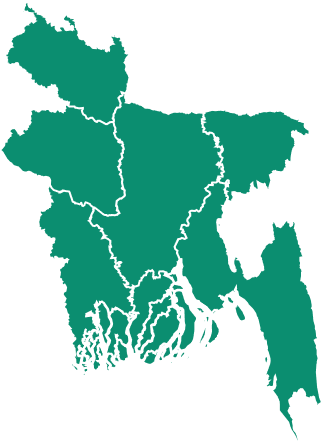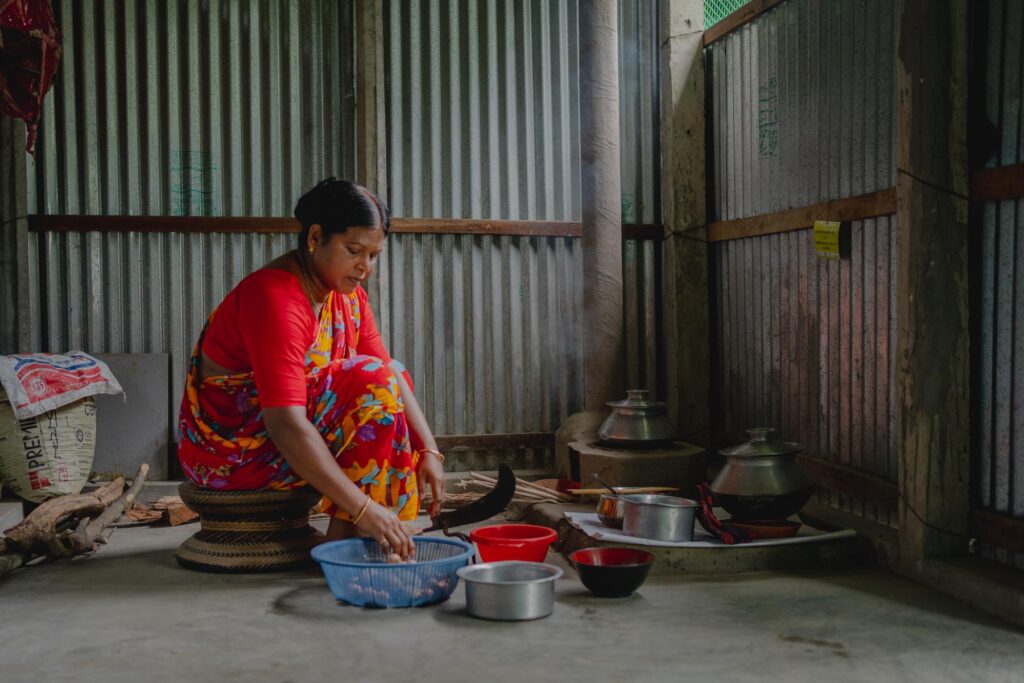Kitchens of Progress:
The Bondhu Chula
The Rural Modular Kitchen Solution





In Bangla, “Bondhu” stands for “friend.” The Bondhu Chula initiative is a distinctive nationwide initiative addressing the widespread use of biomass cooking stoves in rural households. Traditional cookstoves are a leading contributor to indoor air pollution and a drain on forest resources. Almost 28 million households in Bangladesh still use this traditional form of cooking. Our improved cookstove program doubles as an entrepreneurship and livelihoods program while addressing the immediate concern of women’s health and forest degradation. This initiative introduces improved cookstoves that act as a cleaner, more efficient alternative, aligning with the pressing need for clean cooking solutions. Each improved cookstove is manufactured at the village level and installed as a modular, fixed kitchen. Trained women entrepreneurs, locally called “Daktars,” handle the installation and maintenance of these cookstoves. This initiative has led to one of the largest nationwide livelihood programs, involving almost 50,000 entrepreneurs.

Bangladesh
Project Location: 64 Districts, Bangladesh
Methodology: Energy Efficiency Measures in Thermal Applications of Non-renewable Biomass Standard: Gold Standard
![]() Current Deployment:
Current Deployment:
40,000 – 70,000 Bondhu Chulas/month
![]() Total Deployment: 6 Million households
Total Deployment: 6 Million households
![]() Future Expansion: 5 million households
Future Expansion: 5 million households
![]() Income Generating Individuals : 53,000
Income Generating Individuals : 53,000
A Dual Engine for Gender and Livelihoods
The Bondhu Chula project accelerates the adoption of clean cooking solutions, supports micro-entrepreneurs, and is a leading example of climate and development action at scale. The local communities, especially women, are trained in installing and maintaining Bondhu Chula, a modular fixed cookstove that, by default, becomes the primary kitchen of the household. Micro-entrepreneurs who manufacture the cookstove are trained to ensure quality, while subsidies and performance-based incentives motivate their engagement. This sustainable model positively impacts both the product and the community it serves.






The integration of chimneys into every Bondhu Chula effectively minimizes the exposure to Household Air Pollution (HAP) for the women and girl children of the household. Since this program has exposure to millions of households, there has been a visible decrease in the occurrence of respiratory diseases across the country.
The program employs almost 50,000 women in installation and maintenance jobs. These women, most of whom are homemakers without any source of income, instantly gain an outlet for social engagement and income. This is an invaluable gender intervention, especially for countries like Bangladesh. For the women and girl children as users, an added benefit of minimizing the time needed for cooking and fuel collection rolls in. These advantages lead to them having quality time to pursue their interests, enhance social engagement, and work on their well-being in general.
Climbing up the energy ladder is of profound importance to the rural women of Bangladesh. In a country so ravaged by floods and typhoons, access to energy is one of the pillars of survival. This program is about a ‘just transition’ at scale. Over 25 million households in the country still use traditional methods of cooking, so the transition to cleaner sources needs to start now.
Our employment model operates through capacity building and incentives for grassroots communities enabling sustainable results at scale. There are employment and entrepreneurship opportunities at various levels of the program. This includes 200 people at the corporate office, 1,500 people at the regional office and training centers, over 6,000 Bondhu Chula manufacturers at village levels, and 50,000 women ‘Daktars’ working with the households. This ushers in a livelihoods program, which is crucial for the long-term sustainability of such large-scale programs.
Improved cooking programs are challenging, especially when done on a large scale. Adoption rates depend on user-friendliness and quick access to maintenance. Local economic development is another crucial element for the long-term sustainability of the program. A multi-tiered approach, keeping all these considerations in mind has helped this program achieve climate action at scale, a scale required for most cooking programs for a ‘just transition.’
Reduced HAP, Increased Health Benefits

The integration of chimneys into every Bondhu Chula effectively minimizes the exposure to Household Air Pollution (HAP) for the women and girl children of the household. Since this program has exposure to millions of households, there has been a visible decrease in the occurrence of respiratory diseases across the country.
Women Entrepreneurs: Income Generation for Dignity

The program employs almost 50,000 women in installation and maintenance jobs. These women, most of whom are homemakers without any source of income, instantly gain an outlet for social engagement and income. This is an invaluable gender intervention, especially for countries like Bangladesh. For the women and girl children as users, an added benefit of minimizing the time needed for cooking and fuel collection rolls in. These advantages lead to them having quality time to pursue their interests, enhance social engagement, and work on their well-being in general.
Improved Modular Rural Kitchens at Scale

Climbing up the energy ladder is of profound importance to the rural women of Bangladesh. In a country so ravaged by floods and typhoons, access to energy is one of the pillars of survival. This program is about a ‘just transition’ at scale. Over 25 million households in the country still use traditional methods of cooking, so the transition to cleaner sources needs to start now.
Decent Work and Economic Growth

Our employment model operates through capacity building and incentives for grassroots communities enabling sustainable results at scale. There are employment and entrepreneurship opportunities at various levels of the program. This includes 200 people at the corporate office, 1,500 people at the regional office and training centers, over 6,000 Bondhu Chula manufacturers at village levels, and 50,000 women ‘Daktars’ working with the households. This ushers in a livelihoods program, which is crucial for the long-term sustainability of such large-scale programs.
Transition at Scale

Improved cooking programs are challenging, especially when done on a large scale. Adoption rates depend on user-friendliness and quick access to maintenance. Local economic development is another crucial element for the long-term sustainability of the program. A multi-tiered approach, keeping all these considerations in mind has helped this program achieve climate action at scale, a scale required for most cooking programs for a ‘just transition.’
Gallery












Be Part of
the Solution.
Be Part of the Solution.
Real Stories, Real Change

Manjai's Story

Earlier, I used to cook on a traditional stove. The entire house used to get filled with smoke and black soot. I also fell sick more often. It was difficult for me to breathe (while using a stove). After using Bondhu Chula, there is no smoke, black soot, or any residue on the utensils.
Manjai Costa
Doxin Bhadarti
Ghaziabad, Bangladesh


